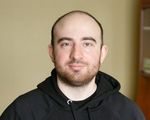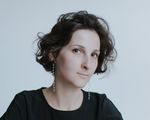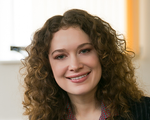About Success Builder
How do you find your place in life? How do you find something to do that both comes naturally to you and makes you happy? The answer is that you have to apply the knowledge you’ve gained from university and from life itself correctly. The Success Builder Project features HSE University graduates who have discovered themselves through an interesting business or an unexpected profession. The protagonists share their experiences and lessons learnt and talk about how they’ve made the most of the opportunities they were given.
Dmitry Storcheus set out to become an economist, but then shifted gears abruptly and went into mathematics. With a Master’s degree from the Courant Institute of Mathematical Sciences of New York University, he now works as a software engineer for Google and continues to conduct research with his academic supervisor and work on his PhD thesis. Here, he tells Success Builder why ICEF Mathematics graduates are head and shoulders above their U.S. competitors, why Facebook and Google are opening departments at universities, what ‘self-learning neural networks’ are and whether they threaten to unleash a real-life ‘Terminator’ against humanity.
Mathematics has essentially become your profession, although you started out as an economist. Was it difficult to make the switch to technology?
The ICEF programme provides a good grounding in mathematics. It emphasizes econometrics, statistics and calculus. The teachers themselves add another dimension with the result that students really like these subjects. I had calculus with Jeffrey Lockshin. It was great, and it really helped me take it to another level.
Honestly, mathematics at ICEF is much stronger than in any U.S. bachelor’s degree programme in the U.S., and Russian students are head and shoulders above Western students in this area
However, this alone does not justify jumping into a technical speciality: you still need to study and earn your degree. In the new field, you will not be competing with economists, but with mathematicians. You need to be aware of this and be prepared for the fact that, to some extent, you are starting over — but from a good position. The fact that ICEF graduates have this option is worth a lot.
Choosing my path wasn’t easy, I shifted focus several times. I genuinely liked quantitative finance and stochastic analysis and generally wanted to do research. I thought about following the academic path but realized that if I wanted to develop along technical lines, I would need a diploma in mathematics. A math degree is necessary to do any university work in this field. I began searching for a programme and university to continue my education and get a math degree.
What role did your hands-on experience play in choosing to pursue engineering?
I interned as an equity analyst with Credit Suisse. There I built models of oil companies and did standard economic analysis. Only a person with an economics background can get that job, so it wasn’t possible to see how a job in technology would work in practice. To get into technology, you need a degree in the pertinent speciality. Yandex, for example, always prefers a programmer to a financier for technical tasks. But in the process of working, I became convinced that finance was not for me.
What about Fintech?
In my opinion, fintech companies also prefer a person with a technical degree because the employee will have to sell software, set tasks for programmers, deal with user experience and data analysis, etc. Basic knowledge of economics is more important in management and business-related fields, but the best way now to get into fintech is to earn a technical degree after graduating from ICEF. Then you’ll be the kind of first-rate specialist they need. It’s good to get additional education in this area, especially with the strong background in mathematics that ICEF offers.
How did this background help you, especially in going straight from ICEF to a math programme at a Western university?
In many ways, I was definitely stronger in math than my Western competitors were. But the cultural preparation I received from studying in an international setting turned out to be even more important. I’m talking about the ICEF educational environment itself — the exam process, the articles you read, the teachers with whom you interact and the fact that you study in English. After ICEF, it’s easy to enter a Western university because you’ve already studied in an international environment. When you come to an American university, it’s like nothing has changed. You’re right at home. There’s no frustration, adaptation period, stress and so on. The only thing that’s different is your area of study, but importantly, the culture remains the same one to which you were already accustomed.
Why were you interested specifically in the Courant Institute of Mathematical Sciences in New York?
I was looking for math programmes and universities that also have a reputation as research centres.
The most difficult part of the application process was explaining to the university why I wanted to change my educational emphasis from economics to mathematics
I had been a successful economics student who suddenly wanted to switch to math, so I had to explain my rationale, why it wasn’t just a passing whim and convince them that I would take it seriously. To prove that I was sincere, I had to come up with a whole story of why I needed a math degree, replete with real-life case studies. It got to the point where I considered paying a screenwriter to write the thing.
Of course, in addition to the letter, you need to show off your grades in math subjects. Some schools such as Stanford, the University of Michigan and the University of Chicago required that applicants in this field also take the GRE Mathematics Subject Test.
To what degree is the Courant Institute aware of the actual needs of technology companies? Was your degree in theoretical or applied mathematics?
I started in theoretical mathematics, then switched to an applied field — Computer Science. University studies can generally be divided into these two areas, but now they overlap quite a bit and people hop from one to the other. Theorists write articles and computer scientists take that research and apply it to problem-solving.
The Institute is 100% in sync with the interests of technology corporations. But more precisely, the Institute knows more than the industry does, so Big Tech cooperates closely with universities. Members of the computer science community in the U.S. are in an ongoing dialogue with the industry. The result is that during your studies, you have a clear understanding of what everything is for, which tasks you will have to solve on the job and what the next steps are. At the same time, universities still use the traditional approach for familiarizing students with companies — career fairs and internships, with students recruited right at the university.
When did you first have a definite idea of how and where you would work after university?
I mostly studied theory during my first year of graduate school and wondered what I could do with it. But in my second year, I realized that all of this was perfectly applicable to machine learning, so I focused on that going forward. Several years ago, NYU opened what you might call an applied PhD programme in cooperation with tech companies Google, Facebook and Uber. In 2017, after working at Google for three years, I became one of the first students of that programme and am now working towards my PhD. These companies encourage their new employees to pursue applied research. While you work, you also study at the institute and undertake a joint project with a research advisor that will become your PhD dissertation, and this project will benefit the company. Thus, at Google, I also conduct research with my research advisor who has been with me since my Master’s degree, Professor Mehryar Mohri.
What are scientists currently doing in the popular field of machine learning and what are the demands of the market?
The trends in this area change every year. In recent years, young researches have been determined to study so-called ‘deep learning.’ This is popular because neural network algorithms are increasingly used in media content and in classifying and generating text. Professor Mohri and I are currently studying AutoML (automatic machine learning). These are algorithms that themselves create machine learning without programmers, whereas in classical ML, a person had to compose and configure the network before it could carry out its assigned tasks.
In our scheme, ML itself creates ML — essentially self-learning machine learning. I study this because, first, it is the latest trend and, second, because Google and many other corporations need it to automate processes and free up programmers to do other things. AutoML is also a way to make ML accessible to the masses. For example, a specialist without any ML knowledge could download one of our libraries such as AdaNet and the library itself would configure the optimal ML algorithm needed.
How does the company address ethical issues? Could machines violate human values or harm us in some way? Could AutoML create a Terminator that would take over Google?
I assure you, it is not dangerous. True, the system does break down sometimes, so it requires periodic calibration and retraining. It often makes unexpected mistakes. Unlike the fear of technology that inspired movies and various sci-fi stories in the late 20th century, a somewhat different set of issues has arisen with regard to technology today. Almost daily, some conference or other discusses ethical questions concerning AI and machine learning and companies create special committees on the ethics of technology. This year, the Vatican, along with Microsoft President Brad Smith and IBM Executive Vice President John Kelly signed a set of rules called the Rome Call for AI Ethics.
One of the problems is that ML algorithms — that learn from data — often discriminate on social grounds such as race, gender, age, etc. The U.S. judicial system has already had to deal with the consequences of using neural networks to compile 'behavioural maps' of prisoners and of major companies’ HR departments that have started using elements of neural networks to assess new hires.
Tech giants and public institutions face an interesting task — making ML produce results that are free from bias and incapable of discriminating
The answer of how to do this remains unclear, but philosophers, lawyers and computer scientists are working on it.
Considering that you work with famed scientist Mehryar Mohri, what advice can you offer on finding a mentor? What’s the trick?
Mehryar Mohri and I have been working together for eight years and going well. The choice of a research advisor is the most important thing in a research career and, as it turned out in my case, in a corporate career. I also had great research advisors at ICEF — Alexey Belyanin and Sergey Gelman — who taught me a lot. Actually, the master’s degree programmes at some Western universities do not require a research supervisor or dissertation. In my case, however, and especially considering that I’m earning a PhD, a research advisor was necessary. And that person becomes a full-fledged co-author of your research and all your successful findings.
There are no hard and fast rules concerning the search for a mentor, except that you should share similar academic and research interests. From personal experience, I can say that similar habits and work styles are also very important: whether you both like to work at night or in the early morning, plough through a huge number of tasks all at once or chat over coffee or steak at the university café. In any case, you’ll be twice as likely to succeed if you have these in common. Because you will be spending your time in very close contact, if your working rhythms do not match, everything will end in conflict and a parting of ways.
How did you conduct your job search and what is happening now in the U.S. labour market with regard to engineering?
Again, Mohri helped me with work: he is a Google employee and it was on his recommendation that I came here to continue my research in the field of AutoML. Employers in technical fields are interested in only one thing: how you solve their test assignment. It doesn’t matter who you are, what type of person you are, which soft skills you’ve got — they check only your hard skills, and if you do the task well, you’re hired. In my case, I did well on the test. This is a feature of the labour market in technical fields. By contrast, in business, economics and many other areas, your communication skills are, doubtless, extremely important.
Keep in mind that U.S. law is on your side also. You can challenge an employer’s decision in court if it was based on a subjective attitude and prejudice. If you excelled technically but not hired, you have the right to appeal the decision, including through the court.
Selecting someone for a job in the U.S. is a delicate dance between the personal and the professional: no one has the right to ask you about your private life or to delve into your psychological makeup
I am currently involved in interviewing job applicants at Google. All interviewers undergo special ‘ethics’ training in which we are taught how to conduct interviews and the limits of what is allowed. I got lucky when I was hired: thanks to Professor Mohri, I was fast-tracked, which spared me from going through several stages of the usual selection process. Now, from the other side, I find it interesting to observe how the process normally works.
Which job did you start with at Google and what did it involve?
I began as a software engineer. This is the starting position at 90% of technology companies, but the responsibilities and tasks involved vary widely. I work in the research division of Google Research. This is very similar to how Soviet research institutes worked: like those, we conduct academic research aimed at addressing internal production objectives. We usually take an academic problem, write a scientific paper on it and create a library that solves the problem quantitatively. Then Google uses the library to improve its product.
For example, the company uses our advances in machine learning to find the best neural network architecture for many different applications automatically. Whenever Google plans to launch a neural network, it uses AutoML to optimize its operation and data collection, eliminating the need to bring in a programmer at that stage of the process. AutoML now powers the Cloud ML resource, a service for corporate clients that uses machine learning to process data.
What other developments would you like to see in your field, and how might it change in the future?
As a researcher, I would like to use the theoretical foundation that Professor Mohri and I have built at Google and during my PhD studies in order to make top-notch ML libraries and solve substantial problems. I could stay at Google, developing within the corporate framework and implementing our advances there, or I could work with startups where my libraries would be useful and in demand. In fact, Google encourages employees to launch startups and provides various forms of support.
Have you thought about teaching?
That’s an interesting option, but I find teaching super difficult. My heart really goes out to professors who have to present lectures. I admire what they do, but I would find it really tough to read students’ work and answer their questions. It’s easier for me to do programming and to quietly work in solitude with the numbers.
Is it true what they say, that people who work with numbers are introverts?
It does seem that way.













































































































































